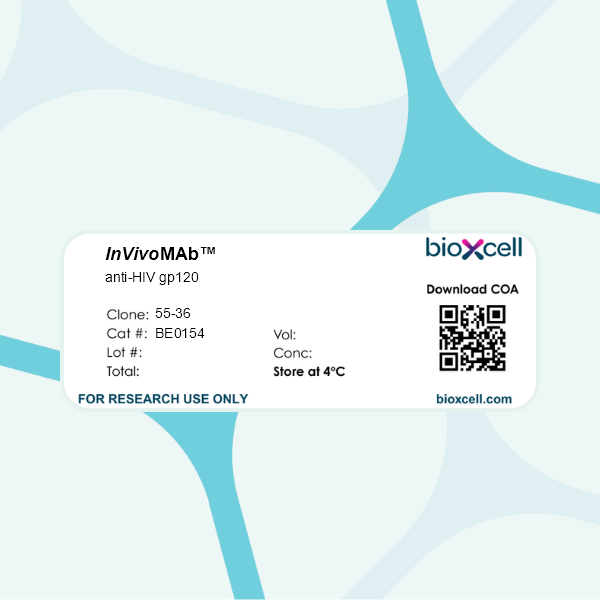InVivoMAb anti-HIV gp120
Product Description
Specifications
| Isotype | Mouse IgG1, κ |
|---|---|
| Recommended Isotype Control(s) | InVivoMAb mouse IgG1 isotype control, unknown specificity |
| Recommended Dilution Buffer | InVivoPure pH 7.0 Dilution Buffer |
| Conjugation | This product is unconjugated. Conjugation is available via our Antibody Conjugation Services. |
| Immunogen | Recombinant gp120 |
| Formulation |
PBS, pH 7.0 Contains no stabilizers or preservatives |
| Endotoxin |
≤1EU/mg (≤0.001EU/μg) Determined by LAL assay |
| Purity |
≥95% Determined by SDS-PAGE |
| Sterility | 0.2 µm filtration |
| Production | Purified from cell culture supernatant in an animal-free facility |
| Purification | Protein G |
| RRID | AB_10950313 |
| Molecular Weight | 150 kDa |
| Storage | The antibody solution should be stored at the stock concentration at 4°C. Do not freeze. |
| Need a Custom Formulation? | See All Antibody Customization Options |
Product Citations
-
-
In vivo experiments
-
Mus musculus (Mouse)
-
Cancer Research
Microbiota triggers STING-type I IFN-dependent monocyte reprogramming of the tumor microenvironment.
In Cell on 14 October 2021 by Lam, K. C., Araya, R. E., et al.
PubMed
The tumor microenvironment (TME) influences cancer progression and therapy response. Therefore, understanding what regulates the TME immune compartment is vital. Here we show that microbiota signals program mononuclear phagocytes in the TME toward immunostimulatory monocytes and dendritic cells (DCs). Single-cell RNA sequencing revealed that absence of microbiota skews the TME toward pro-tumorigenic macrophages. Mechanistically, we show that microbiota-derived stimulator of interferon genes (STING) agonists induce type I interferon (IFN-I) production by intratumoral monocytes to regulate macrophage polarization and natural killer (NK) cell-DC crosstalk. Microbiota modulation with a high-fiber diet triggered the intratumoral IFN-I-NK cell-DC axis and improved the efficacy of immune checkpoint blockade (ICB). We validated our findings in individuals with melanoma treated with ICB and showed that the predicted intratumoral IFN-I and immune compositional differences between responder and non-responder individuals can be transferred by fecal microbiota transplantation. Our study uncovers a mechanistic link between the microbiota and the innate TME that can be harnessed to improve cancer therapies.
-

